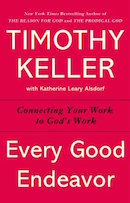Preventing Burnout: The Lies We Tell Ourselves
Blog / Produced by The High Calling
I tucked the envelope under the stack of folders in my arm. It came in the company mail with my name on it. I knew what was in it—a gift certificate from headquarters to a fast-food restaurant that didn’t even have a branch within 300 miles. A weak attempt to thank me for my work. At least they tried. I think everyone got one.
At first, I shrugged it off, wondering if I could re-gift it to an unsuspecting nephew. But then I started overthinking, struggling with the implications. What were they really trying to say? I thought about the weeks—and months that went by without a single word of encouragement. Despite my belief in God’s High Calling, it’s true I often slog my way through my duties, mere chores in the labor of life.
It’s times like these that I listen to the voices of doubt. “Hey you. You’re a fraud, a fake, a shyster.” The voice sounds like my own. It is my own, an echo of every fear within me. I’ve heard it before—plenty of times.
I replayed the tape of my mistake last year that took a team to undo. And the time six years ago when I was told to shape up—or ship out. Maybe the voice was right. Maybe I was a phony. In no time flat the bold decisive middle manager was reduced to a bumbling corporate paperweight.
I took the envelope and flung it awkwardly toward the trash can. It missed, joining the paper wrapper from the sandwich that didn’t quite make it into the canister either.
Story of my life.
When frustration meets fatigue
This stuttering realization of my own inadequacy hits me when I least expect it. I rush to a meeting, scanning messages on my Blackberry, and furtively look around to see the company I’m with. No one is there but that pesky voice. Ducking into the bathroom, I catch my own gaze in the mirror. Tired. Empty. Am I alone?
I scroll through my inboxes, screaming with deadlines and information then look away. The piles on my desk are morphing, blending in a single hump of dysfunction. Here it comes again. Sneaky devil. Does any of this matter?
The connection between burnout and feelings of inadequacy is a frightening one. I shouldn’t feel this way. I have a family, a church, a group of friends that fill my time. I think I matter to people. But work is different. I wonder if they could fill my job with just anybody, that maybe my salary could be cut in half by a fresh face or even eliminated by an eager intern.
Burnout robs us of our passion. It strangles our hearts. It makes us forget who we really are. We fill our lives with endless pursuits that simply return our hearts to start. We work long hours for recognition that never comes. We drop in our beds exhausted—and lonely. The truth is, I was the one who chose isolation over God.
It doesn’t have to be this way.
“Please be not silent”
The busier we are—at work or at home—we desperately need the strength of an infinite God who knows us better than we know ourselves. We need to hear from him. Martin Luther simply stated, “Bless us, O. Lord, yea, even curse us—but please be not silent.”
Like a good manager, I breathe deep and start this process, a pathway of progress. I write down my frustrations and my sorrows. One piece of paper at a time, I sort them out into three piles: Deal with Now, File, or Throw away. I lay my hands upon these piles. I hear his voice call to me from the deep. “Cast all your cares upon me.”
I then scoop all those frustrations into a single pile and wad them into a massive ball. Crumpled and now powerless over me, I close my eyes and heave it toward the cylinder. The past pain arcs slowly toward the ceiling and drops into the waste basket.
There’s no missing this time.
Preventing Burnout
Research shows that those most vulnerable to occupational burnout are individuals who are highly motivated and strongly invested in their work. When work is an important source of finding meaning, frustrations that arise from unmet goals and expectations in the workplace can permeate all of life. This can lead to a general sense of exhaustion, cynicism, and feelings of reduced efficacy. In this series at The High Calling, we’re talking about Preventing Burnout and how faith can make a difference. We hope you find this conversation helpful and if so will consider inviting others to join in the discussion by sharing these stories via email, Facebook, Twitter, or networks you are part of.








